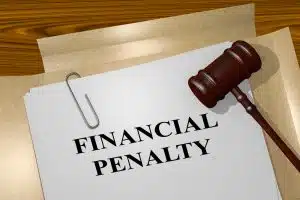
Failing to meet this deadline can result in HMRC late filing penalties. These penalties are designed to incentivize timely filing and compliance with tax regulations.
The late filing penalty amount is typically based on the duration of the delay and the size of the company.
As the delay extends, the penalty increases, potentially adding a considerable financial burden on the company. Additionally, HMRC may charge interest on any outstanding tax liabilities, further compounding the financial consequences. Late filing can also trigger increased scrutiny from tax authorities, leading to potential investigations and audits.
To avoid HMRC late filing penalties and associated complications, companies should be diligent in meeting tax deadlines and seek professional advice if encountering difficulties in fulfilling their tax obligations on time
What are corporation tax late filing penalties?
Corporation tax late filing penalties in the United Kingdom are governed by the relevant provisions outlined in the Corporation Tax Act 2010.
This Act sets out the rules and regulations related to corporation tax, including the deadlines for filing tax returns and the penalties for late submission.
Section 12AC of the Corporation Tax Act 2010 specifically addresses late filing penalties and provides the legal framework for HM Revenue and Customs (HMRC) to administer these penalties. It outlines the calculation of penalties based on the duration of the delay and the size of the company, ensuring that companies are incentivized to file their corporation tax returns on time to maintain compliance with tax laws.
Being familiar with the Corporation Tax Act 2010 is crucial for businesses operating in the UK, as it governs their tax obligations and the potential consequences for non-compliance.
Late filing penalties for corporation tax
Late filing of corporation tax returns can lead to significant financial penalties for businesses in the UK. The penalties are designed to encourage timely compliance with tax obligations and deter late submissions. The structure of these penalties is as follows:
- An initial penalty of £100 is applied if the tax return is even a single day late.
- For continued delays, additional penalties are enforced:
- 3 months late: A further £100 penalty
- 6 months late: 10% of the unpaid tax amount, as estimated by HM Revenue and Customs (HMRC)
- 12 months late: Another 10% of any unpaid tax, in addition to previous penalties
Repeated instances of late filing can lead to even higher financial repercussions:
- If the tax return is late three times in a row, the penalties are increased to £500 each for filing one day late and three months late.
- The 10% surcharge applies to any remaining unpaid tax after 6 months and 12 months.
It is important for businesses to be aware of these penalties and strive to meet the tax filing deadlines to avoid unnecessary financial burdens and maintain compliance with tax regulations.
How HMRC deals with late filing and payment
HMRC takes late filing and payment of taxes seriously and has established procedures to address these issues. When it comes to late filing of tax returns, HMRC applies penalties based on the duration of the delay. An initial penalty is imposed if the tax return is late by even a single day, and further penalties increase as the delay extends.
For late payment of taxes, HMRC charges interest on the outstanding amount, accruing daily until the tax liability is settled. If a company’s tax return is more than six months overdue, HMRC may conduct a ‘tax determination’ process, estimating the corporation tax owed without an appeals process.
In such cases, the requested amount must be paid, but it can be adjusted if the actual tax liability, along with any penalties and interest due, is eventually filed. HMRC encourages taxpayers to be proactive in meeting their tax obligations, and seeking professional advice or requesting extensions when needed can help prevent unnecessary penalties and consequences.
Being compliant with tax regulations ensures a smoother relationship with HMRC and a reduced risk of facing harsher penalties or legal actions in the long run.
Read more: Negotiation a Time to Pay Arrangement
Frequently asked questions
If corporation tax return is late then HM Revenue & Customs will issue you with a penalty. If your corporation tax return is more than 6 months late, then HMRC will raise a 'tax determination' based on the anticipated tax together with penalties.
If you miss the corporation tax deadline, you may face late filing penalties, financial fines, interest charges, increased scrutiny, reputational damage, and possible 'tax determination' without appeals, so it's crucial to prioritize meeting tax obligations and seek professional advice if needed. What happens if corporation tax return is late?
What happens if you miss corporation tax deadline?
Conclusion
In conclusion, late filing of corporation tax returns can have significant consequences and penalties for businesses. These penalties may include financial fines, interest charges, increased scrutiny from tax authorities, and potential damage to the company’s reputation.
Moreover, in some cases, tax authorities may conduct a ‘tax determination’ without an appeals process, leading to additional financial liabilities.
To avoid these adverse outcomes, businesses must prioritize meeting tax deadlines, adhere to tax regulations, and seek professional advice if encountering difficulties. Being proactive in fulfilling tax obligations ensures compliance, minimizes penalties, and maintains a positive relationship with tax authorities.
With over three decades of experience in the business and turnaround sector, Steve Jones is one of the founders of Business Insolvency Helpline. With specialist knowledge of Insolvency, Liquidations, Administration, Pre-packs, CVA, MVL, Restructuring Advice and Company investment.
